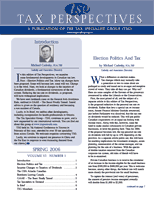
PDF Format
 Issue Contents Issue Contents
 All Issues All Issues
Spring 2006
Volume 6, Number 1
The information in Tax Perspectives is prepared for general interest only. Every effort has been made to ensure that the contents are accurate. However, professional advice should always be obtained before acting and TSG member firms cannot assume any liability for persons who act on the basis of information contained herein without professional advice.
The CRA Attacks Canadian Residents Leaving Canada
By Arnold Sherman, CA, CTA, TEP, FCA (England and Wales)
H. Arnold Sherman Professional Corporation (Calgary)
In the last year or so, I have reviewed the judgements in ten appeals taken to the Tax Court by individuals who have left Canada. In each case, the CRA claimed that the person was still resident here for tax purposes. From my review of these cases, I have developed a list of points to watch when an individual leaves Canada, expecting to become a non-resident for tax purposes. The first step is to take professional advice from someone with experience of Canadian residence problems. A do-it-yourself approach is likely to have an unhappy outcome, as evidenced by several of the court cases. Avoid the CRA by simply breaking all ties to Canada See whether there is a tax treaty between Canada and your new country of residence. For the treaty to apply, you must be a tax resident of the new country. In that case, it may be possible to take advantage of Article 4 of the tax treaty, which defines residence and sets out the tests to determine your residential status. If you have a home in your new country and no residence available for your occupancy in Canada, you will usually be held to be a non-resident of Canada under the terms of the relevant tax treaty. Whether you own a home in Canada is unimportant; the question is whether a home is available for your occupancy. If this test does not settle the matter, there are sequential tests to be considered, including your "centre of vital interests", "habitual abode" and citizenship. You must consult the specific treaty, as there are minor differences in many of them. Absent a treaty, matters become more difficult. The most important point is intent. If you plan to return to Canada, the CRA will almost certainly argue that you remain resident in Canada. Court decisions frequently support the CRA. You should not plan to return to Canada at the time you leave. This does not preclude a change of mind later! As noted below, this means not leaving assets in Canada which may indicate that you expect to return. Absent compelling personal reasons, take your spouse and dependent children with you. A "different" approach taken by two of those who went to the Tax Court was to divorce their spouse before leaving Canada. Make sure you can prove your residence outside Canada, by accumulating documents such as residence permits, tax returns and assessments, or a U.S. green card. If you do not dispose of your home, the court may presume that you are planning to return to Canada in due course. A sale or gift of the home to a family member may not be advisable for the same reason, especially if you later return and reoccupy the home. If you keep it, you might argue (for example) that you did so because the housing market was expected to improve, so you rented it in the meantime. In that case, be sure to document the situation at the time you leave. For the same reason, take your furniture, clothing and personal effects with you, or dispose of them – do not store them in Canada. Close your Canadian bank accounts and cancel your Canadian credit cards. Open bank accounts and get credit cards in your new country. Dispose of your motor vehicles, or take them with you. The court often considers the fact that the appellant kept a car in Canada to be important, indicating that he or she remains resident here. Keeping your car and using it while visiting Canada is viewed unfavourably by the court. Acquire a driver's licence in your new country and let your Canadian licence lapse – do not renew it after you leave. Cancel your provincial medical and hospitalization insurance and be prepared to prove that you have done so. This insurance is only available to residents of the province. If you keep it – and (worse still) if you use it after you leave, you are effectively admitting that you are still resident here. After departure, do not file Canadian tax returns in respect of Canadian source income, unless required, e.g. in the case of Canadian rental income. That sounds obvious, but in several Tax Court cases, the appellant had done just that. Do not keep a Canadian phone number or mailing address. Do not spend too much time in Canada after you leave. I take a very conservative approach, telling my clients that, for the first three years after they leave Canada, they should try to limit their time here to 30 days in each calendar year, or 60 days per annum as a maximum. No move can be perfect from the tax viewpoint. However, moves can be divided into two categories – moves to treaty countries (e.g., U.S. or U.K.) and to non-treaty countries (e.g., tax havens). In the latter case, the secret is to do everything possible to build a case that you are no longer resident in Canada for tax purposes. Unless what you have done is acceptable to the CRA, you may have the choice of agreeing that you are still resident here, or appealing to the Tax Court. To improve your understanding of the CRA's position, there are two useful official sources: - Interpretation Bulletin - IT 221R3. Determination of an Individual's Residence Status.
– Setting out the CRA's position on many points - NR 73 – Determination of Residency Status (Leaving Canada)
– A voluntary form. The questions on the form help to explain the CRA's view on many points. One word of caution – NEVER file this form with the CRA without first taking professional advice.
| 




